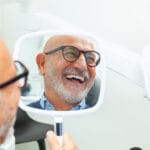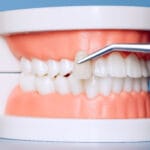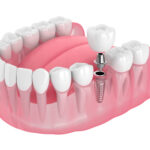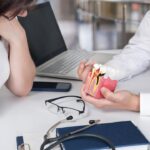Patients can experience several dental problems, some of which are common while others are not. A dental issue of any kind must be addressed because it will cause feelings of discomfort, and if you do not seek treatment, you will eventually experience pain.
Understanding the more frequent dental issues can help you identify them quickly and prevent them in the future. Common dental problems and treatments include:
Tooth decay
This is also called a cavity and is the gradual damage to teeth surfaces. This dental issue is a widespread problem in adults and children and occurs when tooth enamel breaks down due to bacteria overexposure. Bacteria will cause plaque to develop and produce harmful acids that degrade your tooth enamel, and if you expose your teeth to acid frequently, you will eventually lose the protective minerals in your mouth, and cavities will develop.
Cavities can be prevented by following a proper oral hygiene routine, avoiding sugary foods and visiting your dentist regularly. You must brush and floss twice daily and be mindful of sugary and starchy foods that are more likely to harm your teeth. Attending dental appointments every six months will help you identify and address tooth decay more quickly, and your dentist will check for early signs of cavities.
Gingivitis
This is a mild form of gum disease caused by a buildup of plaque deposits. Gingivitis targets your gums and the tissues that protect and support your teeth, and the infection will lead to redness and irritation around your gums. This common problem in adults and adolescents can result from hormonal changes, poor dental hygiene, inadequate nutrition, specific medications or medical conditions.
Gingivitis can become painful if not treated, and the best way to treat this problem is by removing plaque. Dentists use special tools to loosen and dislodge plaque and will clean your teeth thoroughly. They will also provide professional advice regarding oral hygiene techniques to reduce the risk of gingivitis.
Missing teeth
Various reasons can cause a patient to have missing teeth, including injuries and gum disease. Regardless of the cause, missing teeth will not only make it very hard for you to chew food, but it will also increase the risk of other dental issues, and you will likely hide your smile.
Your dentist will discuss tooth replacement options to restore the functionality and appearance of your smile. They may recommend dental implants, bridges, or braces depending on the situation.
Yellow teeth
Your diet, smoking or disease can discolour the natural white shade of your teeth by harming your enamel. Certain foods and beverages can cause tooth discoloration, as can some drinks, including coffee and red wine. Smoking will lead to yellow stains on your teeth, and specific medical conditions can also increase the risk for yellow teeth.
Various strategies can help remove these stains, including professional teeth whitening services or whitening toothpaste and strips you can use at home.
Halitosis
This condition is characterized by bad breath; depending on the cause, it can be a brief or persistent issue. Eating certain foods like garlic and onion, a poor or incorrect dental hygiene routine, and dry mouth can all cause a person to develop halitosis. Still, this condition is treatable with regular oral hygiene and dental visits.
Tooth Sensitivity
Brushing, eating or drinking can cause sensitive teeth to be irritated or painful, and this occurs whenever tooth enamel wears down or roots become exposed, both of which will cause your teeth to become sensitive. Cavities and gum disease can also cause your teeth to become irritated.
Your dentist will help you identify the cause of tooth sensitivity and discuss treatment options, including desensitizing toothpaste or fluoride treatments to strengthen your enamel. Severe cases may require a root canal to remove inflamed pulp from your teeth.
Cracked teeth
This may result from injuries or general wear, and you may notice this problem later. Consider these warning signs if you experience extreme pain while chewing or after exposure to harsh temperatures. Significant cracks can lead to a gum infection, making getting treatment quickly essential.
Visiting your dentist is the best way to fix a cracked tooth; their method will depend on the type and location of your injury. Depending on the severity of the situation, the dentist may need to remove the tooth, or you may require endodontic surgery.
Receding gums
Gum recession is a form of gum disease that occurs when your gums pull away from your teeth, which exposes the roots and causes irritation. Both children and adults can experience this problem, which may be the result of aggressive brushing, genetics, poor oral hygiene or smoking.
Gum recession cannot be reversed, but you can take preventive steps to stop the situation from worsening. Your dentist will diagnose the issue and discuss a treatment plan, including surgery or orthodontics.
Misaligned teeth
This is a common issue; misaligned teeth can make it hard to chew, breathe or speak, depending on the severity. Surgery or tooth removal can treat this problem, and your dentist may refer you to an orthodontist if you require braces to straighten misaligned teeth.
Enamel erosion
This happens when acid wears away your tooth enamel, exposing the next tooth layer. This condition occurs gradually and will break down your tooth surfaces and edges. Enamel erosion increases teeth sensitivity, and eating and drinking will become more painful. Acidic foods and drinks like candy and fruit juice can cause erosion, as can health issues like eating disorders or diabetes.
Treatment will vary based on the cause and severity, and your dentist will discuss options after inspecting the area. They may complete a filling, crown or dental bonding, and you can limit further erosion by reducing your consumption of acidic foods and following proper oral hygiene methods.
Conclusion
Are you suffering from a common dental problem? Slipacoff Dental can help improve your smile! Regular appointments at our clinic will allow us to monitor your teeth and gums, and we will discuss any signs we find concerning. We have been helping patients in Sarnia for many years and specialize in several treatments, including veneers, dental bridges, dental implants and Invisalign.
If you are looking for a family dentist in Sarnia, contact us today to schedule your next appointment!









